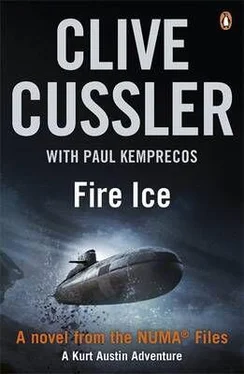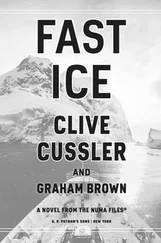Ensign Kreisman stood and said, "It's the least we can do. I'm sure I speak for the crew when I say thanks to you and Joe for getting us out of that place in one piece."
"Remind us to bring a Bradley fighting vehicle the next time," Austin said. He waited for the laughter to die down. "If you don't mind, Ensign, I'll play Perry Mason. I think it will go faster that way."
"No problem, sir."
"Good. Why don't you start from the beginning?"
Kreisman took a position in front of a wall chart that showed the eastern Aegean. "Our mission was to dive on underwater archaeological sites off the Turkish coast. Here." He tapped the map. "In addition to our regular crew under the command of Captain Logan, we carried a guest scientist who called himself Dr. Josef Pulaski, supposedly from MIT."
Gunn raised his hand. "Point of information. After we learned the sub was hijacked, we went over the roster and found Pulaski's name. When we checked with MIT, they said they'd never heard of him."
"Too bad we didn't check before he came on board," the ensign said, with a shake of his head. "In any event, the mission was an unqualified success. We retrieved some artifacts with our manipulator capacity. We were preparing to surface, when Pulaski pulled a gun. Most of the crew was aft of the control room and didn't see it happen. The captain in- formed us over the intercom. He ordered us to stay put.or Pulaski would shoot us. The sub went up a few hundred feet and hovered."
"For how long?" Austin said.
"About twenty-five minutes. Then a huge shadow appeared in the monitors. It looked like a whale or shark coming up under the sub, and then there was a horrendous clang. The sub shook so hard, anyone who wasn't holding on was thrown to the floor. Next we heard a scraping and clawing, as if big metal beetles were crawling around on the outside of the hull. Divers. We could see them on the monitors. One clown even waved at the camera! Next thing we knew, the divers were gone and we were flying through the ocean."
Where were the captain and pilot and the other scientist during all of this?" Austin asked.
"In the control room."
"Did the captain say anything more?"
"Yes, sir. He said to send coffee and sandwiches forward."
"What was the support ship doing at this time?"
"We heard them calling on the radio until Pulaski ordered all communications shut down. I assume they tracked us until we were out of range."
"How long did you travel underwater?" Austin asked.
"A matter of hours. When we surfaced, it was as dark as Hades. Not a light to be seen anywhere. Then armed men came down the hatch into the NR-1."
"Russians?"
"We couldn't tell, although 1 think they were carrying AK-47s. They were wearing cami and acted like professional soldiers. Not like those jerks on horseback that you saved us from. They kept their mouths shut. Pulaski did all the talking. He told us to get out of the NR-1. We climbed out onto the deck of a big sub."
"Any idea on the sub's length?" Gunn said.
Kreisman looked around the room. "Anyone want to take a stab at a guess?"
Another seaman spoke up. "I served on a boomer when I first joined the navy. Judging from its beam, around thirty feet, I’d estimate this baby was as long as a Los Angeles class. About three hundred sixty feet."
"The NR-1 is only one hundred fifty feet long. They could easily piggyback you with more than two hundred feet to spare," Austin said.
The sailor nodded. "That sub was bigger than our support vessel."
Austin glanced around the room. "Anyone see markings?"
Nobody responded. "Too dark and no moon," Kreisman explained.
"So they moved you into the big sub?"
"Correct. They locked us in a bunk room. Not enough beds for all of us, so we took turns sleeping. They brought food from time to time. We submerged for twenty-four hours. When we surfaced again, it was night. The ocean was different from the Aegean. The air didn't have the saltiness we'd been used to. More like one of the Great Lakes."
"Tell them about the ship sounds we heard before that," one of the submariners said.
"Sorry, I forgot about that. It was a while before we surfaced. The bunk room was as quiet as a grave. Some of the guys in the bunks said they could hear the sound of ship engines through the bulkheads. We all put our ears up to the hull and listened. It was true."
"You were in an area of heavy ship traffic?"
"That's what we figured. Eventually, the noise died out. Several hours later, we came up next to a surface ship. It must have been waiting for us. They hustled us onto the ship and into another bunk room. That was our home sweet home for three days."
"They kept you there all that time?" Gunn said.
"Hell, no! Early the next morning, we were assembled on the deck. Guys with guns kept us covered, and the big sub was nowhere to be seen. Pulaski was there. He gave us that creepy smile of his. 'Good morning, gentlemen,' " Kreisman imitated Pulaski's accent. " 'In return for this delightful cruise, we are going to ask that you do a little job for us.' He said we would be salvaging material from an old ship. Pulaski and another thug were going with us. So we piled into the NR-1 alongside the ship, which was acting as our tender, and down we went."
"How deep?"
"Four hundred feet plus. No big deal for the NR-1. We noticed the water buoyancy was different. We needed less ballast to bring us down. The sea bottom was mud for the most part, sloping before it abruptly dropped off into the deep. The wreck sat on the bank of an underwater canyon or valley that ran at right angles to the cliff face."
"Was there a name on the ship's hull?"
"None that we could see. The vessel was covered with seaweed and barnacles. The bow was more up-and-down than raked, like those pictures you see of the Titanic." He used his hand to demonstrate.
"What was its position on the bottom?"
"The ship sat on the slope, leaning over at a sharp angle. It looked as if a good shove would tip it over. We saw a big hole in the starboard side."
"Could you see inside the hole?"
"It was filled in with rubble. We only stayed there a minute. They were more interested in the other side. They had fitted out the manipulator arm with a cutting torch. We touched down on the slanting deck. It was pretty dicey putting the sub down at an angle. We had the feeling the ship could roll over at any time. Then they told us to cut a hole in the superstructure."
"Not in the hold?" Austin said with surprise. "That's where the cargo would be."
"You'd think so, but we weren't in a position to argue. We made an opening around ten by ten feet. It wasn't too hard – the metal was old and rusted. We had to be careful, though. It was like a surgical operation. One nudge and the ship would drop off into the deep; we were all aware of that. We could see the old bunks and mattresses. Pulaski and his buddy got real agitated. They started to jabber over some diagrams of the wreck that they had with them."
"In Russian."
"Sounded like it. Apparently, they'd had us cut through the wrong spot. We tried two more times before they found what they wanted. It was a fairly big cabin filled with metal boxes the size of those old steamer trunks you see in antique shops."
"How many boxes?"
"About a dozen, jumbled every which way. Pulaski told us to grab them with the NR-1's manipulator arm. We had a tough time moving them. They were obviously heavy and strained the manipulator to capacity. We pulled the boxes to the opening and called the surface ship and told them to lower some lines with hooks on the ends of them. We attached the lines, stood off and let the ship winch the stuff up with its superior lifting power."
Austin, who had been trained in deepwater salvage, nodded. "Exactly the way I would have handled it."
Читать дальше












